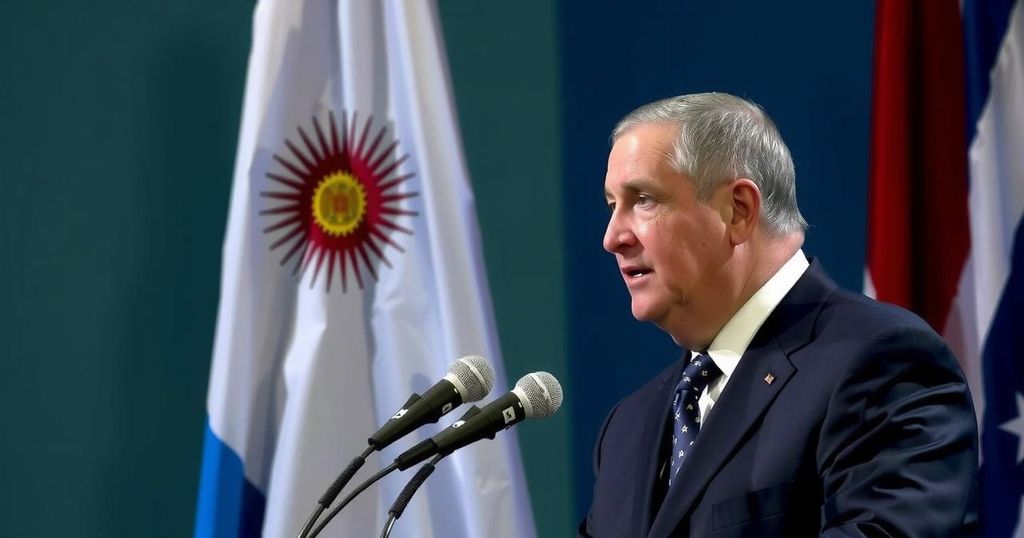Argentina’s President Dismisses Foreign Minister Following Vote to End U.S. Embargo on Cuba

President Javier Milei of Argentina dismissed Foreign Minister Diana Mondino following the nation’s vote in favor of lifting the U.S. embargo on Cuba at the U.N. General Assembly. This dismissal reflects Milei’s commitment to align Argentina’s foreign policy with U.S. and Israeli interests, as well as his opposition to the Cuban government. The administration has initiated an internal review of the Foreign Relations Ministry, emphasizing a focus on human rights and freedom.
In a significant political move, Javier Milei, the President of Argentina, dismissed his foreign affairs minister, Diana Mondino, following the nation’s vote at the United Nations General Assembly in favor of lifting the U.S. economic embargo on Cuba. The decision to replace Mondino with Gerardo Werthein, the Argentine ambassador to the U.S., was announced via a statement from Milei’s spokesman, Manuel Adorni, on the social media platform X. While specific reasons for Mondino’s dismissal were not provided, the timing suggested a direct correlation with the controversial vote against the backdrop of President Milei’s staunch opposition to the Cuban government. In a formal communication, Milei’s office stated, “Our country is categorically opposed to the Cuban dictatorship, and it will remain firm in promoting a foreign policy that condemns all regimes that perpetuate the violation of human rights and individual freedoms.” The vote against the embargo saw a vast majority of 187 nations supporting the resolution, with the United States and Israel voting in opposition. Since assuming office in December 2023, President Milei has aligned Argentina’s foreign policy more closely with the interests of the United States and Israel, distancing himself from the historical positions of several Latin American nations. Moreover, President Milei’s administration has publicly declared support for the policies of right-wing Israeli Prime Minister Benjamin Netanyahu, particularly amidst the ongoing conflict in Gaza, highlighting a divergence from the stance of many neighboring countries that have attempted to sever diplomatic relations with Israel. Mondino’s tenure as Foreign Minister has faced challenges, including a recent incident where her office erroneously referred to the Falkland Islands rather than the “Malvinas,” the term favored in Argentina. Furthermore, a diplomatic trip to China was marred by criticism following an insensitive comment regarding the physical features of Chinese individuals. In response to the unfolding situation, Milei’s administration has initiated an internal audit within the Foreign Relations Ministry to identify any personnel promoting agendas contrary to the government’s views on freedom and human rights.
The geopolitical landscape surrounding Cuba and the U.S. embargo reveals a complex interplay of historical relations and contemporary political positions among Latin American countries. The U.S. economic embargo has been a point of contention since its inception, with nations often divided in their support or opposition. Argentina’s recent vote to support the lifting of the embargo at the U.N. General Assembly reflects a significant ideological stance amid President Javier Milei’s foreign policy shift, which seeks to foster closer ties with the U.S. and Israel, a departure from more traditional Latin American diplomatic norms. The dismissal of Foreign Minister Diana Mondino signifies a tightening of Milei’s grip on Argentina’s foreign policy and underscores ongoing tensions regarding human rights and international relations within the region.
In conclusion, President Javier Milei’s decision to remove Foreign Minister Diana Mondino underscores a pivotal moment in Argentina’s foreign policy trajectory, particularly concerning its stance on Cuba and relations with the U.S. This decision, coupled with Milei’s directive for an audit of the Foreign Relations Ministry, signals his administration’s firm position against regimes he perceives as oppressive, while indicating a clear pivot towards American and Israeli interests. The dismissal highlights the challenges Mondino faced during her brief tenure and illustrates the dynamic and often contentious nature of foreign relations in Latin America.
Original Source: www.mymotherlode.com







